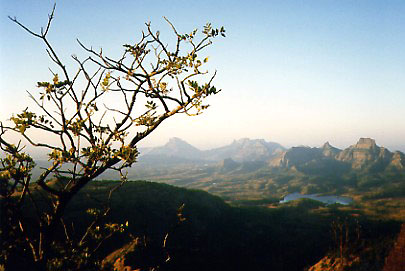|
November 1986
"Aaay, col' drrrinks, fofcorn, chiffsss..." A vendor flashes
a grin at me through the window bars of our "toy" train as it
pants resolutely over the winding narrow-gauge track. Snack tray slung
over his neck, he is swinging adroitly from one carriage to the next along
the foot-boards.
Glenn and Susan, both in their mid-teens, are with me as we chug our way
up to Matheran, a small hill-station resort. They were little more than
toddlers when we left for Canada in 1977, and have only vague of memories
of life in India. Eagerly planned for months, this 6-week trip across
the sub-continent, is as much an adventure of discovery for them, as it
is a journey of nostalgia for me.
We have switched from the main Bombay-Pune railway line to the Matheran
Hill Railway, and are now in a tiny carriage sitting shoulder-to-shoulder
with a young couple and their two children. The boy who appears to be
about ten years old, 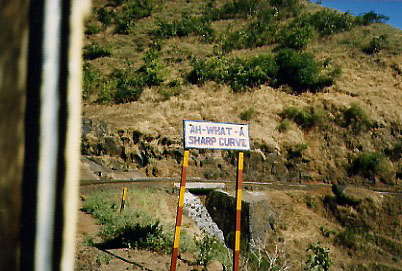 peppers
his father with questions in Gujerati, while his younger sister croons
a little tune to herself as she gazes out of the window. At this initial
stage of our ascent, the terrain is bare rock, interspersed with scrub
and weary, stunted trees, their leaves ashen with dust. We pass a signboard
alongside the track which gasps "Ah What A Sharp Curve" and
the train then dives briefly into "One Kiss" tunnel. peppers
his father with questions in Gujerati, while his younger sister croons
a little tune to herself as she gazes out of the window. At this initial
stage of our ascent, the terrain is bare rock, interspersed with scrub
and weary, stunted trees, their leaves ashen with dust. We pass a signboard
alongside the track which gasps "Ah What A Sharp Curve" and
the train then dives briefly into "One Kiss" tunnel.
The vendor has moved on and another face peers through the window. It
belongs to Mike, a rangy, blonde-bearded student from Ohio. He too is
hitching a ride on the foot board, clinging limpet-like to the door-rail,
or the window bars. If our compartment wasn't so cramped he could have
joined us-but he shrugs: "Aw…it's just as easy to hang out here.
Train's moving slower than a Sunday sermon anyhow. No sweat."
The miniature train sighs to a halt at a small station half way up the
hillside, and passengers get out to stretch their legs. The platform swarms
with hawkers selling trinkets, bottled drinks, tea, coffee and snacks.
A wrinkled old woman whines at the window, and I drop a few coins into
her palms. Her smile is toothless and ingratiating.
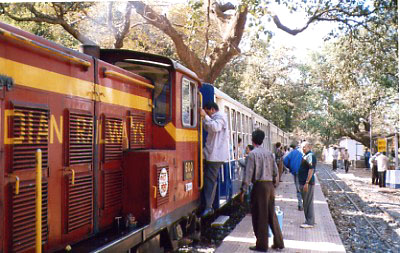
The Gujerati family unpacks a picnic hamper of knobbly chucklis, and glistening
potato bhajias. Before helping themselves, the father turns to us, "Please,"
he says, "try some home made Indian snacks." My Canadian teenagers
exchange glances, apprehensive about accepting hospitality from total
strangers. They have no way of knowing that in India it is customary to
invite fellow travellers to share refreshments. In fact, it would be rude
not to do so and, by the same token, churlish to refuse. I help myself
to a bhajia. "Thank you," I say. "It looks delicious."
The mother beams. "You too, come, come!" She says to Glenn and
Susan. "These are nice and fresh, you will enjoy!"
"Wow!" Susan whispers to me. "How kind of them!"
Not to be outdone in generosity, she digs out two packets of gum from
her backpack and hands them to the kids. The little boy is delighted and,
the ice broken, his sister scrambles over to show us a sketch she has
made of the train.
On the final stage of its ascent, the train snakes along a narrow shelf
hewn into the hillside. Mike, no longer nonchalant about riding the foot
board, squeezes his eyes shut. "Sheeit!" he says feelingly,
"nobody told me about this!" Gripping the window bars, his knuckles
like bleached pebbles, he is suspended over a sheer fifteen-hundred foot
drop of unforgiving rock face. The train takes a turn, and ahead of us,
about a hundred feet up, I catch a glimpse of the wooded plateau that
is Matheran-looking for all the world like a head of broccoli sprouting
on a stem of fissured rock. On the cramped, cliff-hugging side of the
train, the vendors continue to bawl their wares. At the previous station
they have prudently switched sides.
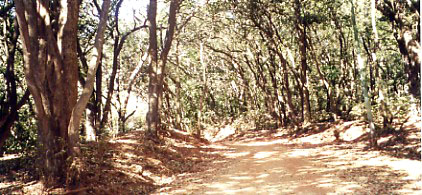
Mike's suffering is short-lived. We level out, travelling through a glade
of spreading trees. The soil is now rust coloured and pathways meander
through the forest. As groups of holiday-makers pause to wave and shout
greetings, the train, in a burst of confidence, puts on a terrific show
of speed. We steam into Matheran station with aplomb.
Tourism being Matheran's only industry, the town meets its municipal budget
by way of a bounty on its visitors' heads. We stop at the "Capitation
Tax" booth near the station exit to pay our fifteen rupees. Coolies-hill
women with straight backs and provocatively swaying hips-heft our suitcases
onto their heads, while we, duly "de-capitated" follow them
to our hotel.
Matheran, which translates loosely as "large forest on top"
has no paved streets or cars, and therefore no traffic intersections or
gasoline fumes. The only motor road from Bombay halts at a parking lot
on the outskirts of the town; from there one travels either by hand-pulled
rickshaws, on horse-back, or by shank's mare. The main drag is a red-dirt
road pretentiously named "Mahatma Gandhi Marg".
It is eighteen years since my last visit but, to my delight, nothing much
seems to have changed. Many of the old shops are still in business. "Nariman
Chikki Mart" is doing a brisk trade in nutty toffee bars and jars
of honey-both of them local specialities. Deepak's Tea and Cold Drink
House" still has rickety wayside tables occupied by honeymooners
gazing soulfully at each other while sipping fresh lime juice.
Unencumbered by memories, Glenn and Susan walk briskly ahead. Then, like
myself, they slow down, diverted by the bazaar scene. Groups of holiday
makers exchange banter. Youngsters suck on popsicles or play hand-made
paper-windmills against the breeze, while their parents haggle over the
price of hand-crafted leather sandals, or embroidered kurtas. Rickshaw
wallahs, their vehicles piled high with baggage or passengers (or both),
toil up slopes. They swerve to one side at the sound of hooves, and the
urgent call of "side! side!" as an occasional horse and rider
thunders along the centre of the road, an anxious groom running in pursuit.
Villagers, turbanned old men with nothing much burdening their day, sit
on their haunches under spreading jambul trees, slurping tea from little
earthenware cups.
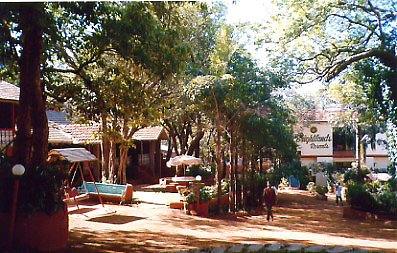 Brightlands Hotel - 2001
Brightlands Hotel - 2001 |
Our holiday resort, a fifteen minute stroll from the station, occupies
a large, shady compound with bungalows sprawled around its perimeter.
The manager, his Bertie Wooster like spectacles flashing efficiently,
shows us to our suite. Stone flagged floors, a large bedroom, an adjoining
dressing room and bathroom. By western standards, the furniture, the hard
mattresses and flat pillows are austere. But, the linen is clean, and
the gargling toilet works-a big plus in India.
The dining table set on the veranda of our bungalow is laid with a fresh
damask tablecloth and a small vase of marigold flowers. Lunch is mullagatawny
soup, followed by a platter of fragrant white rice and a tangy fish curry.
Our waiter is a gnarled old man who wears his starched white uniform and
crested turban with immense dignity. Between courses, he shuffles back
and forth from the kitchens housed in a building across the compound.
We are half way through our main course, when there is an ominous rumble
on the roof.
Susan freezes, her spoon half way to her mouth.
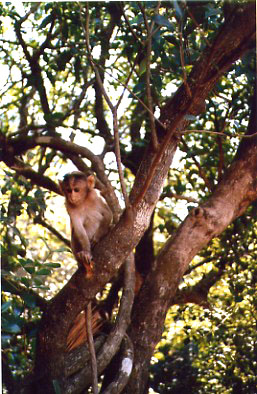 "Monkeys,"
I say, and small army of them descends, swinging off overhanging branches
and landing just beyond the veranda railings. A big male leaps onto the
veranda baring his teeth and eyeing a slice of bread at Glenn's elbow.
There is a shout from across the compound, and a small boy races towards
us, sling-shot poised. The monkey beats a hasty retreat, and the whole
tribe crash off through the trees, in search of easier pickings. The small
boy squats on the steps of the veranda and grins triumphantly. It turns
out that he is the son of the youth-now promoted to waiter-who performed
the same service for my husband, Leon, and myself when we were honeymooners
eighteen years ago. The art of monkey warfare is handed down from generation
to generation in Matheran. "Monkeys,"
I say, and small army of them descends, swinging off overhanging branches
and landing just beyond the veranda railings. A big male leaps onto the
veranda baring his teeth and eyeing a slice of bread at Glenn's elbow.
There is a shout from across the compound, and a small boy races towards
us, sling-shot poised. The monkey beats a hasty retreat, and the whole
tribe crash off through the trees, in search of easier pickings. The small
boy squats on the steps of the veranda and grins triumphantly. It turns
out that he is the son of the youth-now promoted to waiter-who performed
the same service for my husband, Leon, and myself when we were honeymooners
eighteen years ago. The art of monkey warfare is handed down from generation
to generation in Matheran.
I find myself wishing for a slingshot myself as I sit enthroned on the
toilet seat the next morning while a monkey gleefully eyes me through
the glass skylight. I throw a roll of toilet paper at the skylight and
the monkey smirks. Bored, it eventually takes off, thumping over the corrugated-iron
rooftop.
Glenn is curious about the origins of Matheran, but all I can remember
is that an Englishman, Hugh Malet, was the first to climb the Matheran
plateau in the mid-1800s. In the fading years of the Raj, it became a
popular retreat for expatriates seeking refuge from the congestion of
the city. Even though it has no spectacular entertainment to offer-no
skiing or water sports, no golfing or tennis-it remains a weekend get-away
for Bombayites, particularly during the sweltering months of April, May
and early June. With the arrival of the monsoon in late June Matheran
all but closes down and the miniature train ceases to operate until late
September.
"So," asks Glenn, "what are we going to actually do here
for the next three days?"
"Ramble through the woods to various lookout points," I reply.
"Maybe go horseback riding. Browse through the market. Or just laze
around!"
"Maybe we'll find a guide-book, in the bazaar." Susan suggests.
We do. And I pounce on it gleefully. It is the same one (now in its fifteenth
edition) which I'd once owned, but subsequently lost. The author, Mr.
D.M. Utekar, has a narrative style all his own. The introduction, for
example, assures readers that the residents of Matheran are "a friendly
and hospital lot" and, as if to dispel any doubts about the salubrity
of the place, he continues: "In the month of October-November the
earth emerges in a green garment embellished by the beauties of nature,
which has a medical effect on the health of a person" He devotes
several pages to a section entitled "What to See." We decide
to follow the trail to Porcupine Point which, according to Mr. Utekar,
is "so-called because its shape is like the shape of the quill of
that bird."
It is a longer trek than we'd anticipated, but the air is fresh and the
sun-dappled trails wind gently through the trees. The only sound, other
than our voices and the sighing of the breeze, is the shrilling of "croakers"
- the local name for cicadas. En route we take diversions along short
tributary pathways where the trees thin out and bring us to scrub covered
promontories with names like "Coronation Point", "Echo
Point" and "One Tree Hill". From some lookouts, rock formations
like ancient castle fortresses loom across the abyss of the valley.
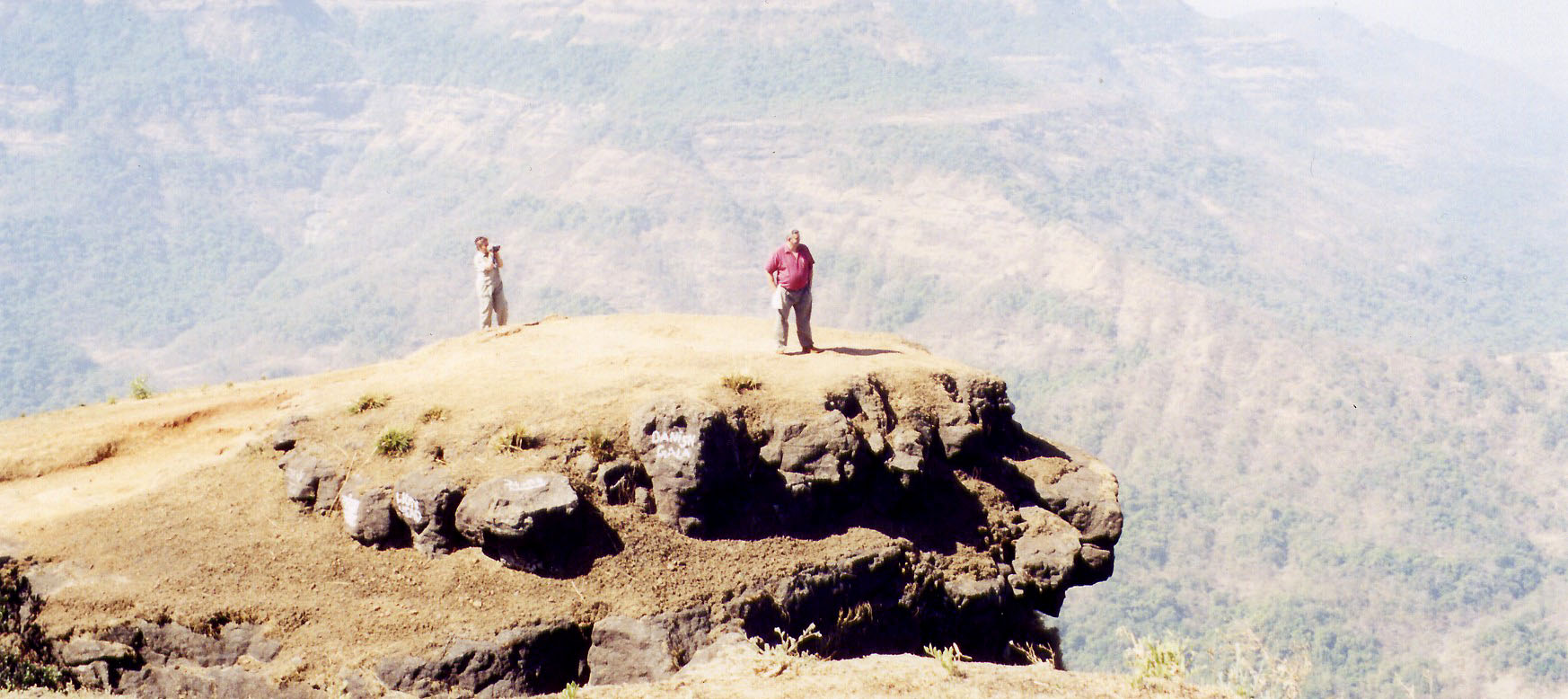 Porcupine Point - 2001: My Aussie cousins Noelene
& Lionel Beardsley
Porcupine Point - 2001: My Aussie cousins Noelene
& Lionel Beardsley |
Porcupine Point turns out to be a tongue-shaped projection which falls
sheer on three sides. Fifteen hundred feet below us lies a quilt of paddy
fields stitched by thin, meandering streams which glint in the strong
sunlight. On our way back we meet a group of hill folk climbing up narrow
steep paths cut into the rock face, and balancing loads of firewood on
their heads. Thin and bare-chested, the men pass us by without a glance,
but the women stop and giggle, their eyes sharp with curiosity.
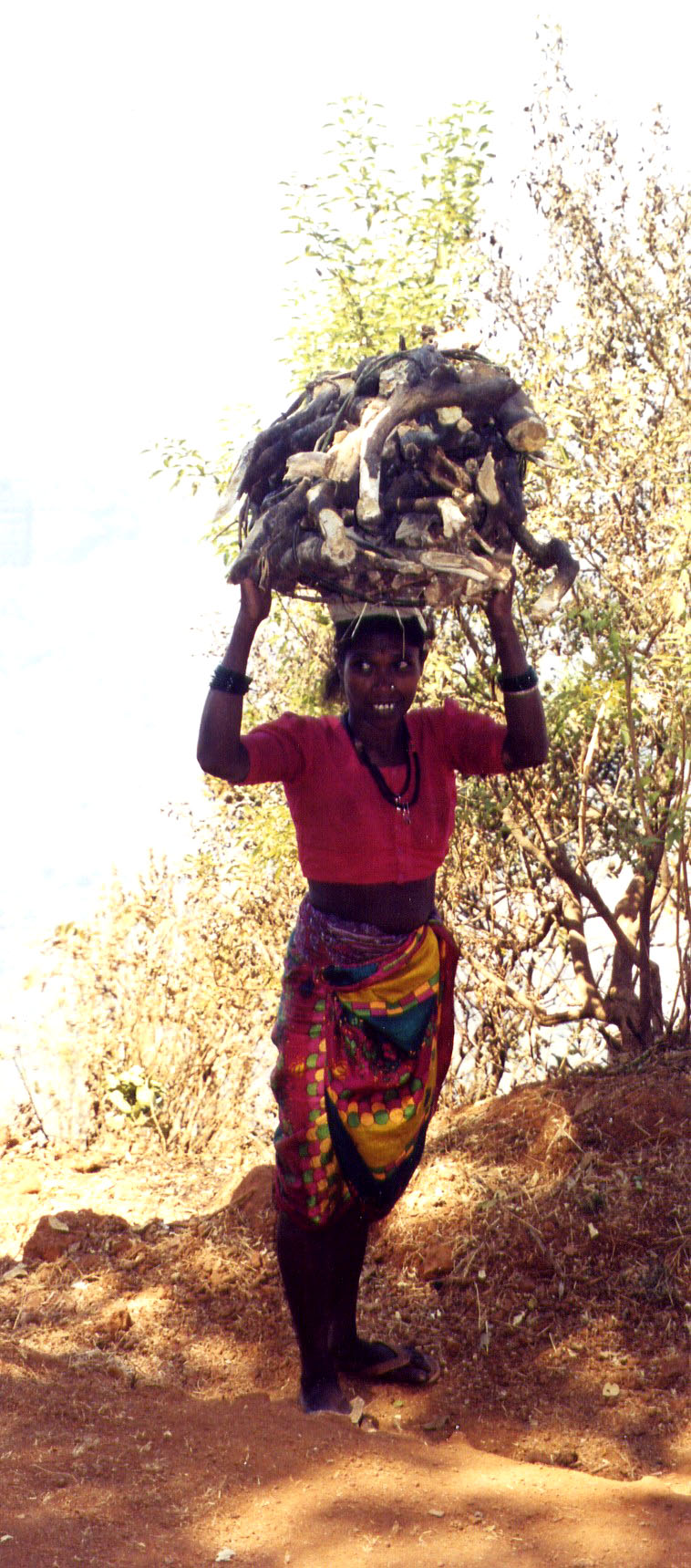 Apart
from being a holiday resort with several hotels, guest-houses and lodges,
Matheran also has a small, but affluent, resident population. Retirees,
mainly, who live in sprawling bungalows with winding pathways and curlicued,
iron-wrought gates, reminiscent of the days of the Raj. Most of these
homes are hidden within forest glades, but some flank the pathways. Apart
from being a holiday resort with several hotels, guest-houses and lodges,
Matheran also has a small, but affluent, resident population. Retirees,
mainly, who live in sprawling bungalows with winding pathways and curlicued,
iron-wrought gates, reminiscent of the days of the Raj. Most of these
homes are hidden within forest glades, but some flank the pathways.
"That one's haunted," I tell Susan and Glenn as we go by a dilapidated
red-brick house.
"Really?" They say in unison, stopping to stare.
"Uh-huh," I say. "It's called "The Red House"
and Matheran residents give it a wide berth. I sure as heck wouldn't hang
around the place, specially after dark. Not after what happened to us."
"What…what?" Susan swings around to face me.
"Well, this was about twenty years ago. I was with a group of office
buddies and we'd come up to Matheran for the weekend. About seven or eight
of us were out on a late night stroll. We were just about here…"
I walk back about fifty yards to indicate the spot. "As we approached
the house, we saw a figure wearing a white shirt and loin-cloth walking
towards us. It moved right under that lamp-post there by the gate of the
Red House. As you can see, the light would have shone directly on it.
One of us, I forget who, said jokingly, 'Now there's a ghost for you!'
The words were no sooner said, than the figure vanished. Kaput. Gone.
Nothing there. Just the empty road under the lamp-post. Yet we'd all seen
it clearly."
"So what did you do?" Glenn asks.
"We turned and ran. Glancing over our shoulders all the way back!
We puzzled over it for days afterwards, but it wasn't till much later
that we heard about the reputation of the Red House."
I glance again at the bungalow, at its crumbling walls and gaping roof.
It looks brooding, secretive.
Susan is intrigued. "Take a photo of us on the veranda, Mum,"
she says. "So I can tell them about it at school."
I feel a prickle of unease, even though it is broad daylight. I shrug.
"Well, okay, but let's make it quick."
She and Glenn stand by the rotting veranda rails and I click the camera.
(The photograph when developed later shows a figure standing just behind
them. It's just a trick of light and shadow, but the effect is eerie nonetheless.)
In the summer season when schools and colleges in Bombay are closed, the
peace of Matheran is shattered by youths engaged in noisy horseplay, their
transistors blasting Hindi film-track music. But now, in November, the
place has a timeless tranquillity. Particularly in the early morning.
I stand on the veranda of our bungalow, sip my first cup of hot, milky
tea, and sniff the familiar smells of rural India-dust and dung, mingled
with the scent of smoke from charcoal fires. The pale dawn sky washes
everything in a silvery light, and lacy-leafed trees tremble in the cool
breeze.
Glenn and I go for a stroll. The pathways are deserted at this hour, but
the morning is alive with movement and sound. A couple of hens pecking
busily in the dust, flutter agitatedly at our approach, and a defiant
cockerel stretches his neck into a long "koo-koo-roo-kooooo"
before strutting off after his wives. Parrots, dawn-flashed into emerald
bursts of colour, screech in counterpoint to the raucous bickering of
crows. In a small clearing, a group of tethered horses snuffle and neigh
as they feed from jute bags.
The main street is just beginning to stir. At a small wayside laundry,
a man hefts an ancient steam iron over a pair of trousers. A few rickshaws
rattle towards the station carrying over-fed matrons on their way to an
early morning train. A jut-ribbed man with a glistening sausage-shaped
skin of water slung over his shoulder, splashes the road to settle the
dust. He stares at my camera, his eyes as ancient and fathomless as India.
I give him a ten rupee note and he touches it to his forehead in thanks.
Across the road and down a couple of steps is a meat and produce market.
Despite the early hour it is busy. Factotums from various hotels haggle
over their purchases, filling their shopping baskets with fruit and vegetables.
A vendor lifts old fashioned scales with iron weights on one platter,
and glistening chillies on the other, and then tosses them into a jute
bag carried by a bent old woman. A yellow-eyed goat picks its way between
the stalls, nibbling on detritus. Further on, a small boy, naked except
for a tattered shirt, squats over an open drain, excreting a thin stream
of waste. Nobody pays him any attention.
Beyond the market, we follow a short, winding pathway and the hillside
drops away into a sheer gorge. It faces east, and the sun, an enormous
orange ball, rises above the surrounding peaks, swings out of the mauve
mist and seems to roll towards Glenn and myself. Behind us, women gather
at a communal tap, thwacking garments against a concrete platform, scrubbing
their shivering kids, and exchanging gossip.
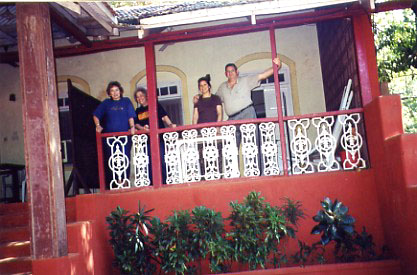 Sister Phyllis
Beavan, myself, Noelene & Lionel - Brightlands Hotel 2001
Sister Phyllis
Beavan, myself, Noelene & Lionel - Brightlands Hotel 2001 |
By the time we get back to the hotel, the pastel light of morning has
given way to brisk sunshine. It is our last day in Matheran, and we are
booked on the afternoon train down to the plains.
The hotel bill arrives, and I'm disconcerted to learn that the hotel doesn't
take travellers' cheques. The hotel manager phones the local Bank of India
office. There is a long exchange in Marathi. I gather that the Bank Manager
is frantically looking up his book of regulations and seems to need reassurance
about (a) our economic/social status in general, and (b) the financial
viability of American Express in particular. Eventually we are informed
that cashing my cheques will be "no problem."
The bank's exterior is unpretentious-a small building with a corrugated
tin roof and a dusty signboard. A bespectacled clerk, behind a barred
window, noisily sips his tea while reading a newspaper. He stands up as
we enter and dusts off three creaky wooden chairs. "Pliss to sit.
I am informing Manager of your arrival.". A stenographer pecking
at an old manual typewriter steals sideways glances at us, while the peon
standing outside the door of the Manager's office gawks at us with open
curiosity. There are no other customers. We are the event of the week.
The Manager is a thin young man with an anxious expression. It grows even
more anxious as he scrutinises my hundred dollar Canadian travellers'
cheques. He hands them to me. "Pliss, you must also sign your backside,"
he says. Susan and Glenn exchange glances, but remain commendably straight-faced.
Fifteen minutes later I am presented with a thick wad of rupee notes.
Business completed, the Manager turns expansive. "You will have some
chai, no?" Without waiting for our response, the peon is despatched
to bring four cups of steaming tea. Meanwhile, tells us that he once had
a Canadian pen-pal. "But now I am not knowing his whereabouts,"
he says wobbling his head regretfully. Before we leave, he marshals the
bank staff into line and, flanked by Glenn and Susan, they pose, self-conscious
and unsmiling, for my camera. "We will be waiting for a copy of the
photo," he says in farewell. "And, maybe next time you come,
you will do me the honour of visiting my house. My wife is very good cook."
"Jeez," Glenn says as we exit the bank. "What 'a friendly
and hospital' man!"
On our way back to the resort, we pass two men sitting cross-legged on
a mat, absorbed in a chess game. A group of rag-tag spectators offers
unsolicited, and at times jeering, advice. It turns out that this is the
final game in a match which has lasted a week. The two protagonists are
scruffy-and one of them belches frequently between moves. The other rubs
a thoughtful finger between his large toe and its companion, rolling away
the dry skin, and flicking pellets into the dust.
We stop briefly to watch. The belcher eventually makes an 'aarrh' sound
deep in his throat, expectorates a stream of red betel-nut juice to the
side of the road, and disgustedly tipples over his king in surrender.
The audience claps. The toe-cleaning winner beams and invites Glenn to
a game. But we have to move on. Our train leaves in a couple of hours,
and we still have to pack, eat lunch and check out of the hotel. "Come
back tomorrow then baba," urges the winner, hoisting his other foot
into position and going to work on the rest of his metatarsals. "I
will estill be here..."
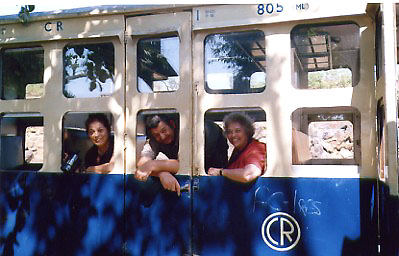 Noelene, Lionel and I aboard the little choo-choo
at Neral: 2001
Noelene, Lionel and I aboard the little choo-choo
at Neral: 2001 |
As our little train shudders into life and we pull out of the station,
I say a silent farewell to the little hill resort where, sequestered from
the urgency of the world around it, the days are as gentle as the breeze
through its jambul trees. Perhaps in the years ahead, Matheran's hotels
will install swimming pools, TVs (some already have), and hot water plumbing.
But the red-earth trails will still meander serenely through the glades,
and ghosts of the past will still inhabit the bungalows tucked away in
the woods. Matheran "chikki" toffee will still be sold in the
shops and the cheeky monkey population will continue to mooch tidbits
from the unwary. And, likely as not, the bazaar's chess champion will
"estill" be there too, with the skin between his toes scoured
to depletion.
* * * * *
Note:
This visit with my son, Glenn, and daughter, Susan, took place in
1987, but when I went to Matheran again in February of 2001, (along with
my sister Phyllis Beavan, and Aussie cousins, Noelene and Lionel Beardsley)
much indeed had changed. Several multi-storied hotels have sprung up,
and with their garishly painted "modern" architecture, they
are hideously incongruous among the gently forested glades.
Brightlands is now an upscale resort with a swimming pool, outdoor
bar and restaurant, a sauna and exercise room, a concert hall-cum-theatre
and a large indoor dining room. Their meals are superb-and on request
they are happy to serve these on the verandas fronting the guest rooms.
Guests have a variety of activities to choose from: billiards, tennis,
badminton and even a miniature golf course. All the rooms have been spiffed
up-the interior décor and furnishings are comfortable and tasteful,
the bathrooms are fitted with gleaming taps, washbasins, toilets and soak
tubs, and each room has its own refrigerator and TV. To their credit,
however, they have retained the original bungalows, which are dotted around
prettily landscaped gardens-and the entire estate is still charmingly
wooded and tranquil. And, yes, they now accept all major credit cards
and travellers' cheques too!
The Red House is no more. It has been demolished and a sprawling luxury
hotel now occupies the site. We didn't enquire whether the resident ghost
had also been demolished.
The monkey population hasn't decreased; they still make their presence
felt at mealtimes, and the young monkey chasers continue to heft their
sling-shots!
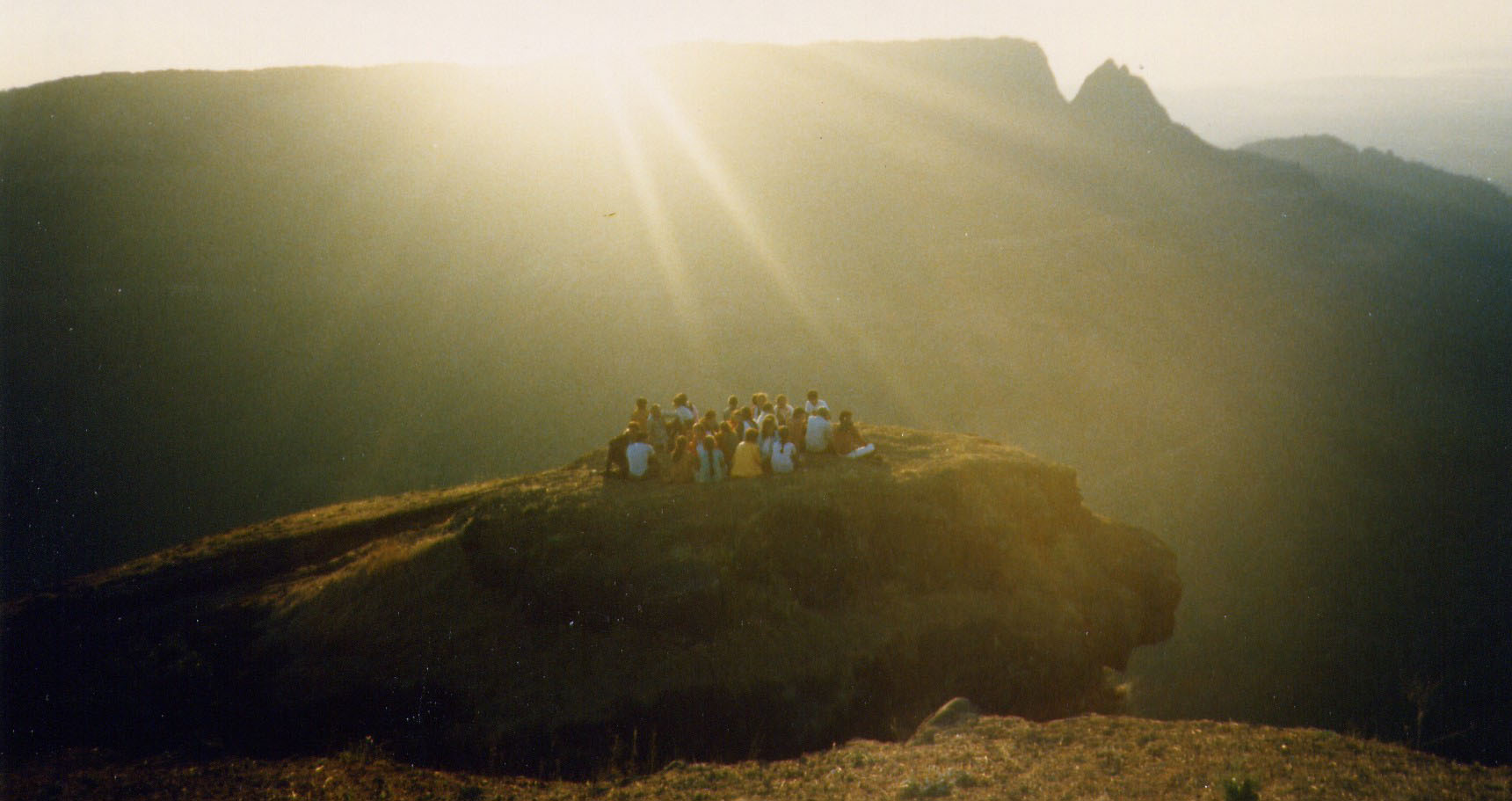 Sunset at Porcupine Point
Sunset at Porcupine Point |
Back to "India My India"
Page
Back to Welcome Page
|
